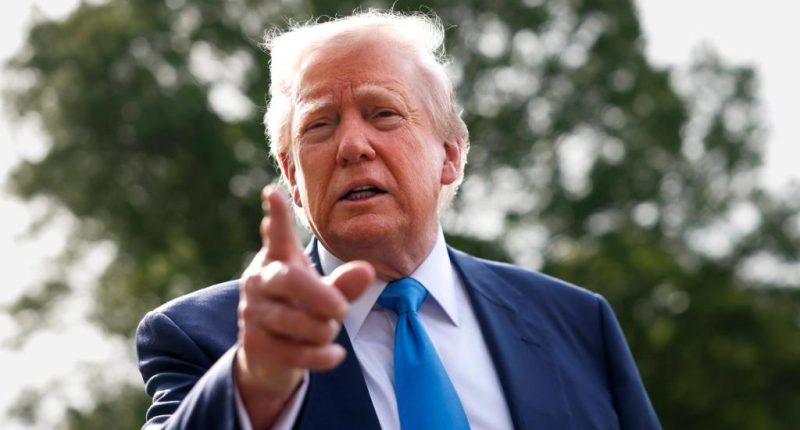
“What’s the difference between God and a federal judge?” goes the old joke. Answer: “God knows he’s not a federal judge.”
The district judges issuing scores of “nationwide” injunctions against President Trump appear to take this gag with deadly seriousness.
Under this dubious practice, a single federal judge claims the ability to block a law or executive order not just in his or her city or state, but throughout the country.
As Supreme Court Justice Neil Gorsuch has wryly observed, they seem to think their power is not just nationwide, but “universal” or even “cosmic.”
But the Trump administration is looking to counter these judges’ overreach, without taking the politically and constitutionally extreme steps of impeachment or defying a court order.
It’s doing so through a canny Supreme Court filing that contested the nationwide injunctions blocking Trump’s bid to end birthright citizenship.
The government’s plea in that case didn’t center on the problem of “birth tourism” — but instead presented the justices with a “modest” proposal: end nationwide injunctions because they violate the Constitution.
Last week, the court appeared to take Trump up on the offer, announcing a highly irregular May 15 oral-argument session on the case — at a time when the justices are usually polishing their last opinions for the term and packing their bags for the summer break.
Nationwide injunctions have proven a disaster for the federal judiciary.
While judges have used them against presidents of both parties — conservatives won them to stop former President Biden’s student-loan cancellations, for example — judges have reserved a special place in their courtrooms for Trump.
By the end of March, just 10 weeks into Trump’s second term, federal judges had issued 17 such injunctions — more than George W. Bush, Barack Obama, or Joe Biden received in their entire terms in office. The anti-Trump tally will almost certainly hit 20, if not two dozen, by the end of April.
That’s given nationwide injunctions an undeniably partisan cast.
Worse yet, judges must violate the Constitution to issue them.
Article III of the Constitution limits the federal judicial power only to “cases and controversies” — that is, to the legal claims that appear directly before them in the courtroom.
Breaching these limits, Justice Antonin Scalia warned long ago, allows the courts “to assume a position of authority over [a] co-equal department and to become virtually continuing monitors of . . . Executive action,” rather than its legality.
Nationwide injunctions also short-circuit the judiciary’s ability to reach sound decisions.
Congress has the constitutional authority to create the lower federal courts. The decentralized system it has established includes 94 federal district courts throughout the country, overseen by 13 geographic circuit courts of appeal.
Cases usually reach the Supreme Court after they have “percolated” up through this system, and multiple judges and courts have weighed in on the issue, often coming to conflicting conclusions.
But a nationwide injunction thwarts that process. By forbidding the elected president’s policy throughout the nation, no other appeals courts can consider the issue, as if a single umpire called an entire baseball playoff series by himself.
Instead of percolation and multifaceted consideration, the legal issues receive short shrift. The president has only a single choice: to quickly seek Supreme Court review.
At least five sitting justices have joined opinions sharing these legal concerns.
In 2017, Justice Clarence Thomas first identified the lack of legal authority for judges to issue nationwide injunctions, calling them “legally and historically dubious.”
Gorsuch, joined by Thomas and Justice Amy Coney Barrett, declared in 2023 that these court orders violate the limited powers of the federal courts, which can only “render judgment or decree upon the rights of the litigants,” not upon all theoretical plaintiffs throughout the country.
In February, Justice Samuel Alito argued that nationwide injunctions violate the “foundational limits” on the jurisdiction of the federal courts to issue remedies — in a dissent joined by Thomas, Gorsuch, and Justice Brett Kavanaugh.
Even liberal Justice Elena Kagan declared in a 2022 speech, “It just can’t be right that one district judge can stop a nationwide policy in its tracks and leave it stopped for the years that it takes to go through the normal process” of appeal.
Trump may not win the court’s blessing of his birthright citizenship argument. But if the justices put an end to disruptive and unconstitutional nationwide injunctions, they will serve a greater constitutional good.
For example, the high court might order trial judges to limit their rulings only to the parties who appear in their courtrooms and no others, as the Constitution requires.
Other plaintiffs who wish to vindicate their rights through the courts, such as children born to illegal aliens in other cities, would have to bring their own lawsuits.
By repairing the guardrails on rogue trial judges, the justices can begin to restore the limits on the power of the judiciary and the proper Constitutional respect for the president’s authority to develop and carry out executive policy.
John Yoo is a distinguished visiting professor at the School of Civic Leadership at the University of Texas at Austin, where he is also a senior research fellow at the Civitas Institute.








